Hello shepherd lovers, today I will explain in detail why are German Shepherd Puppies Black.
German shepherd puppies are often born with black fur. People wonder why. We’ll explore this. By looking at their genes, how they were bred in the past, and how the breed has changed over time, we’ll try to understand why these puppies start off black. Come along as we uncover the reasons behind this interesting aspect of German shepherd puppies and why it’s so fascinating to people who love these dogs.
German Shepherd puppies can be born black due to genetics. The gene responsible for their coat coloration is the Agouti Signaling Protein (ASIP) gene. This gene controls the distribution of pigment in the dog’s coat. When puppies are born, their coat colors can vary depending on the combination of genes inherited from their parents.
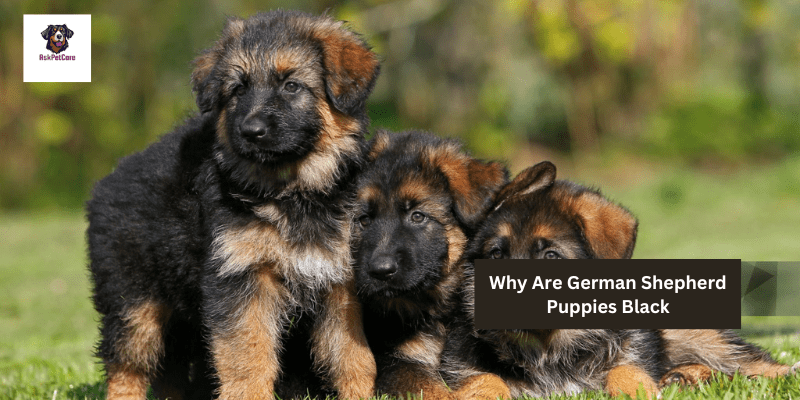
While the typical coloration for German Shepherds is black and tan, some puppies may be born with solid black coats. This black coat color is often a result of genetic factors and may change as the puppy grows older. As the puppy matures, their coat might develop the classic black and tan pattern commonly associated with the breed. However, some German Shepherds may retain their solid black coloration throughout their lives.
Hello everyone who loves dogs! I’m Dr. Arif Aziz, and I’ve been taking care of pets especially dogs at my clinic for a long time, exactly 14 years! I’m here to share some valuable information with you that I’ve gathered from books during my study time written by experts in veterinary medicine (DVM) and MSC (Master of Science), as well as from my own experiences working with dogs.
The Genetic Makeup Overview of the genes responsible for coat color in German Shepherds.
When it comes to understanding why some German Shepherd puppies are born black, we need to delve into the world of genetics. You see, just like how we inherit certain traits from our parents, puppies inherit genes that determine their appearance, including their coat color.
In German Shepherds, there are specific genes responsible for coat coloration. These genes come in pairs, with one gene inherited from each parent. Think of it like a recipe book with instructions for making a dog’s coat color.
Now, there are different versions of these genes, each with its own instructions for producing a specific coat color. Some versions might lead to black fur, while others might result in tan or sable coats. When puppies inherit certain combinations of these genes, it determines their coat color.
But here’s where it gets interesting: genetics isn’t always straightforward. Sometimes, puppies can inherit a combination of genes that result in unexpected coat colors. This is why you might occasionally see German Shepherd puppies born with black fur, even if both parents have different coat colors.
In essence, genetics is like a complex puzzle, with each piece contributing to the overall picture of a puppy’s appearance. By understanding how these genes work together, we can start to unravel the mystery behind why some German Shepherd puppies are born black.
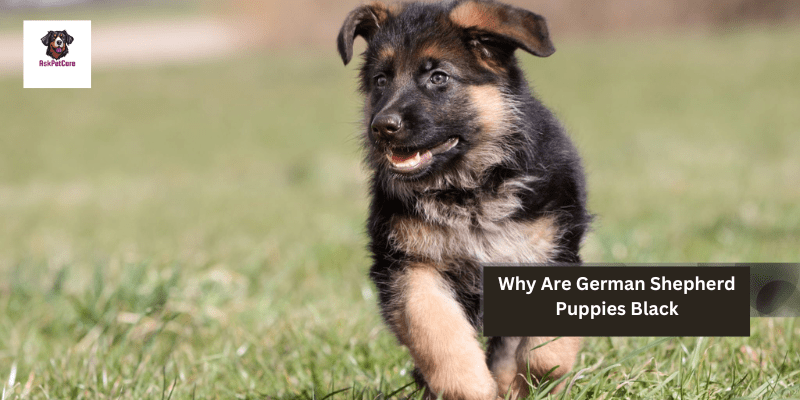
The breeding history of German Shepherds.
To understand why there are so many black German Shepherd puppies today, we need to take a look back at how these dogs were bred in the past.
A long time ago, German Shepherds were primarily working dogs, valued for their intelligence, loyalty, and versatility. Back then, breeders focused on traits that would make them excellent herders and guardians.
Interestingly, coat color wasn’t always a top priority for breeders. Instead, they focused on other qualities like temperament and athleticism. This meant that German Shepherds were bred for their skills rather than their appearance.
Over time, as the breed gained popularity, people started to pay more attention to coat color. Some breeders began selectively breeding for specific colors, like the classic black and tan coat. However, not all breeders followed this trend.
As a result, there were still German Shepherds with black coats in the breeding pool. And because genetics can be unpredictable, black puppies would occasionally be born, even if both parents had different coat colors.
So, in a way, the historical breeding practices of German Shepherds contributed to the diversity of coat colors we see today, including the prevalence of black puppies. It’s a fascinating glimpse into the rich history of this beloved breed and how it has evolved.
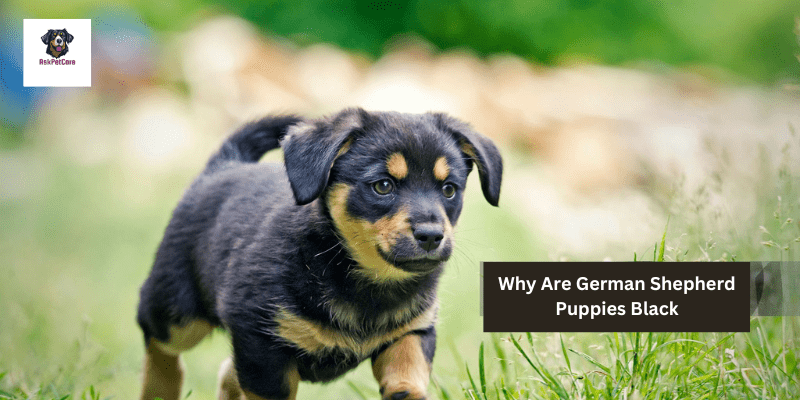
Evolution of the Breed Exploration of how the German Shepherd breed has evolved over time.
The German Shepherd breed has come a long way since its origins. Originally bred in Germany as versatile working dogs, German Shepherds were prized for their intelligence, loyalty, and strong work ethic.
As the breed gained popularity, breeders began to selectively breed German Shepherds for specific traits, including coat color. Some breeders preferred the classic black and tan coat, while others favored different colors like sable or solid black.
Selective breeding involves choosing which dogs to breed based on desired traits. So, if a breeder wanted to produce black German Shepherd puppies, they would selectively breed dogs with black coats.
Over time, this selective breeding has influenced the prevalence of certain coat colors within the German Shepherd breed. While black German Shepherds may not have been as common in the past, they have become more popular over time due to selective breeding practices.
However, it’s important to note that selective breeding can also have unintended consequences. By focusing too much on specific traits, such as coat color, breeders may inadvertently increase the risk of genetic health problems within the breed.
Overall, the evolution of the German Shepherd breed and the influence of selective breeding have played a significant role in shaping the coat colors we see today, including the prevalence of black German Shepherd puppies.
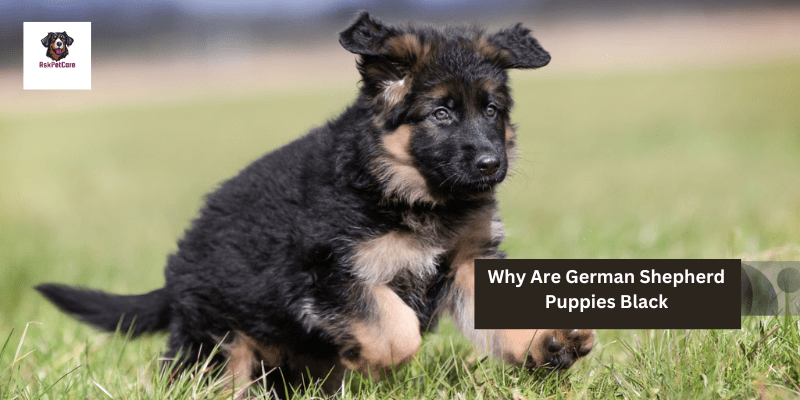
Discussion of various factors that may contribute to black coat color in German Shepherd puppies.
There are a few reasons why some German Shepherd puppies end up with black coats. It’s not just about genetics; other factors can play a role too.
First off, let’s talk about genetics. We know that genes passed down from the parents determine a puppy’s coat color. But sometimes, even if both parents don’t have black coats, they might carry genes for black fur. When these genes come together in the puppy, it can result in a black coat.
Next, there are environmental factors to consider. Things like diet, exposure to sunlight, and overall health can affect a puppy’s coat color. For example, a puppy with a poor diet might not get all the nutrients it needs for healthy fur growth, which could impact its coat color.
Then there’s something called “epigenetics.” This is how outside factors can influence which genes are turned on or off in a puppy. So, even if a puppy has the genes for a different coat color, environmental factors could cause those genes to express themselves differently, resulting in a black coat.
In essence, it’s a combination of genetics and environmental influences that determine why some German Shepherd puppies are born with black coats. It’s a fascinating mix of nature and nurture that adds to the unique beauty of these dogs.
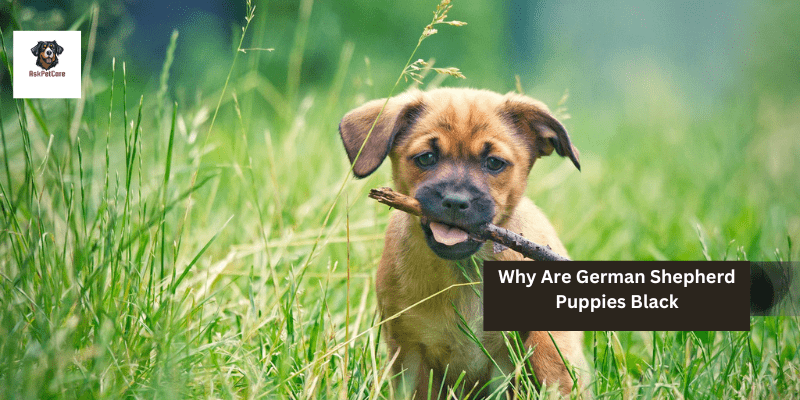
Explanation of the significance of black coat color in German Shepherds.
Black German Shepherd puppies hold a special place in the hearts of many dog lovers, but what’s the significance of their dark fur?
Well, for starters, black German Shepherds are just as capable, intelligent, and loyal as their tan or sable counterparts. Their coat color doesn’t affect their abilities or temperament. In fact, some people prefer black German Shepherds for their sleek and striking appearance.
However, there are some misconceptions surrounding black German Shepherds. One myth is that they are more aggressive or less trainable than other colors. This simply isn’t true. A dog’s behavior is determined by factors like genetics, upbringing, and training, not just coat color.
Another misconception is that black German Shepherds are rare or less desirable. While they may not be as common as tan or sable German Shepherds, they are still valued members of the breed. Every German Shepherd, regardless of color, has its own unique qualities and deserves love and respect.
So, the next time you see a black German Shepherd puppy, remember that their coat color is just one part of who they are. They are loyal companions, devoted protectors, and beloved family members, regardless of the color of their fur.
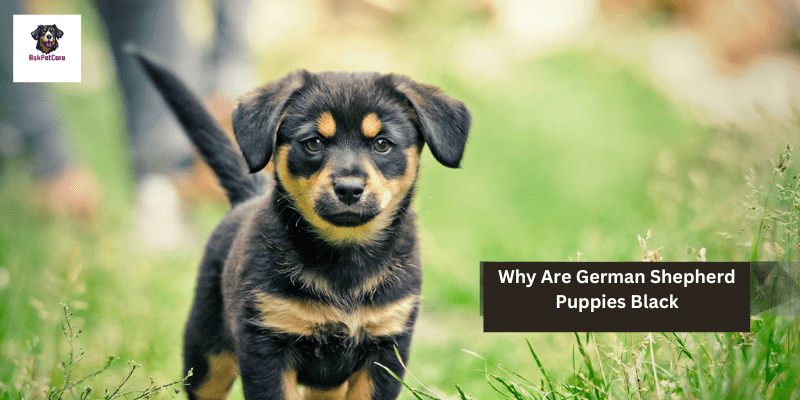
Why are German shepherd puppies black in the winter?
Have you ever noticed that some German Shepherd puppies seem to get darker during the winter months? It’s a curious phenomenon, but there’s a straightforward explanation behind it.
You see, dogs, including German Shepherds, have what’s called a double-layered coat. The outer layer, known as the guard hairs, helps protect them from the elements, while the inner layer keeps them warm.
During the winter, dogs experience something called photoperiodism. This means that their bodies respond to changes in daylight hours. As the days get shorter and the nights get longer, their bodies produce more of a hormone called melanin, which is responsible for pigmentation in their fur.
More melanin production leads to darker fur, so German Shepherd puppies may appear blacker in the winter than they do in the summer. It’s like their way of putting on a thicker coat to stay warm during the colder months.
So, the next time you see a German Shepherd puppy with a darker coat in the winter, remember that it’s just their natural response to the changing seasons, helping them stay cozy and comfortable as temperatures drop.
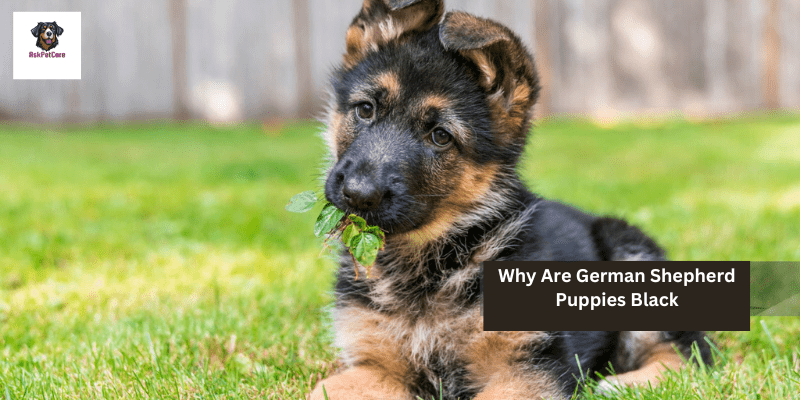
Why are German shepherd puppies black and white?
German Shepherd puppies can be black and white due to a combination of genetics and inheritance from their parents.
In the case of black and white German Shepherds, it’s essential to understand that the breed’s typical coat colors are black and tan, or sable. However, genetic variation and breeding practices can result in different coat colors, including black and white.
Genetically, coat color in dogs is determined by multiple genes, each controlling different aspects of coloration. These genes can interact in complex ways, leading to a wide range of coat colors and patterns. In German Shepherds, genes for black coloration and white spotting may both be present, allowing for the expression of a black and white coat.
Breeding practices also play a role in producing black and white German Shepherd puppies. Some breeders may intentionally select for specific coat colors or patterns, including black and white, by breeding dogs with desired traits. However, it’s essential to note that black and white German Shepherds may not be as common as other coat color variations within the breed.
Ultimately, the presence of black and white German Shepherd puppies is a result of genetic variation, breeding practices, and inheritance from their parents. While less common than other coat colors, black and white German Shepherds are still valued members of the breed, cherished for their unique appearance and personality.
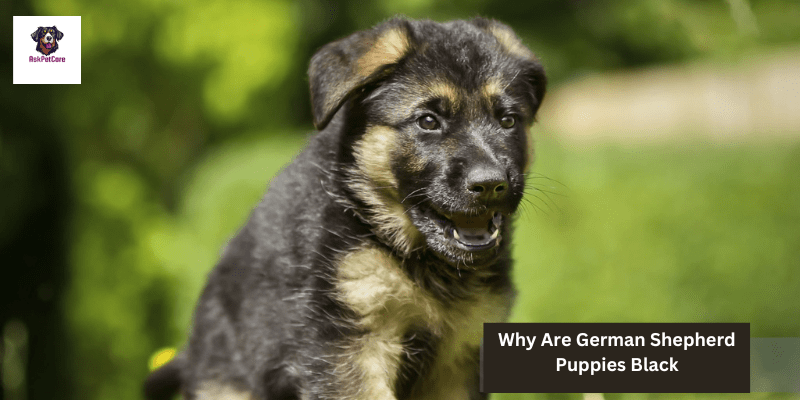
black face german shepherd puppy:
A black-faced German Shepherd puppy typically refers to a German Shepherd with predominantly black coloring on its face. This can include a black mask covering the muzzle and sometimes extending to the forehead and ears, while the rest of the body may have a different coat color pattern.
Black-faced German Shepherds are not a separate breed but rather a variation within the German Shepherd breed. The black mask is a result of genetics, where certain genes control the distribution of pigment in the dog’s coat. In some cases, this can lead to a more pronounced black coloring on the face compared to the rest of the body.
Many people find black-faced German Shepherd puppies striking and attractive due to their distinctive appearance. However, it’s essential to remember that coat color variations do not affect the dog’s temperament or suitability as a pet. Whether a German Shepherd has a black face, tan face, or any other coat color pattern, they can make loyal and loving companions with proper care and training.
Why are German Shepherd puppies born black?
German Shepherd puppies are sometimes born black due to genetics. The genes responsible for coat coloration can result in puppies being born with a black coat. As they grow older, their coat color may change to the more typical black and tan or sable pattern associated with the breed.
How rare are black German Shepherd puppies?
Black German Shepherd puppies are less common than other coat color variations within the breed, such as black and tan or sable. While not extremely rare, they are often sought after by enthusiasts who appreciate their unique appearance.
How do I know what color my German Shepherd puppy will be?
Predicting the exact color of a German Shepherd puppy can be challenging, as it depends on the genetic makeup inherited from its parents. Generally, breeders can provide insight into the potential coat colors based on the colors of the parents and their lineage.
How can I tell if my black German Shepherd is purebred?
To determine if a black German Shepherd is purebred, you can look for certain breed characteristics such as body proportions, ear shape, and temperament. Additionally, obtaining pedigree papers from reputable breeders can confirm the lineage and ensure the dog’s purebred status. However, coat color alone is not a reliable indicator of purity.
I hope you will understand why the German Shepherd puppy was born black, still any quarry contact me.
Here are some reference books that are considered authoritative on the topic of dog care, including nail care:
- “The Complete Dog Owner’s Manual” by Dr. Bruce Fogle
- “The Ultimate Guide to Dog Care: Everything You Need to Know to Keep Your Dog Happy and Healthy” by Amy Marder and Andrew Luescher
